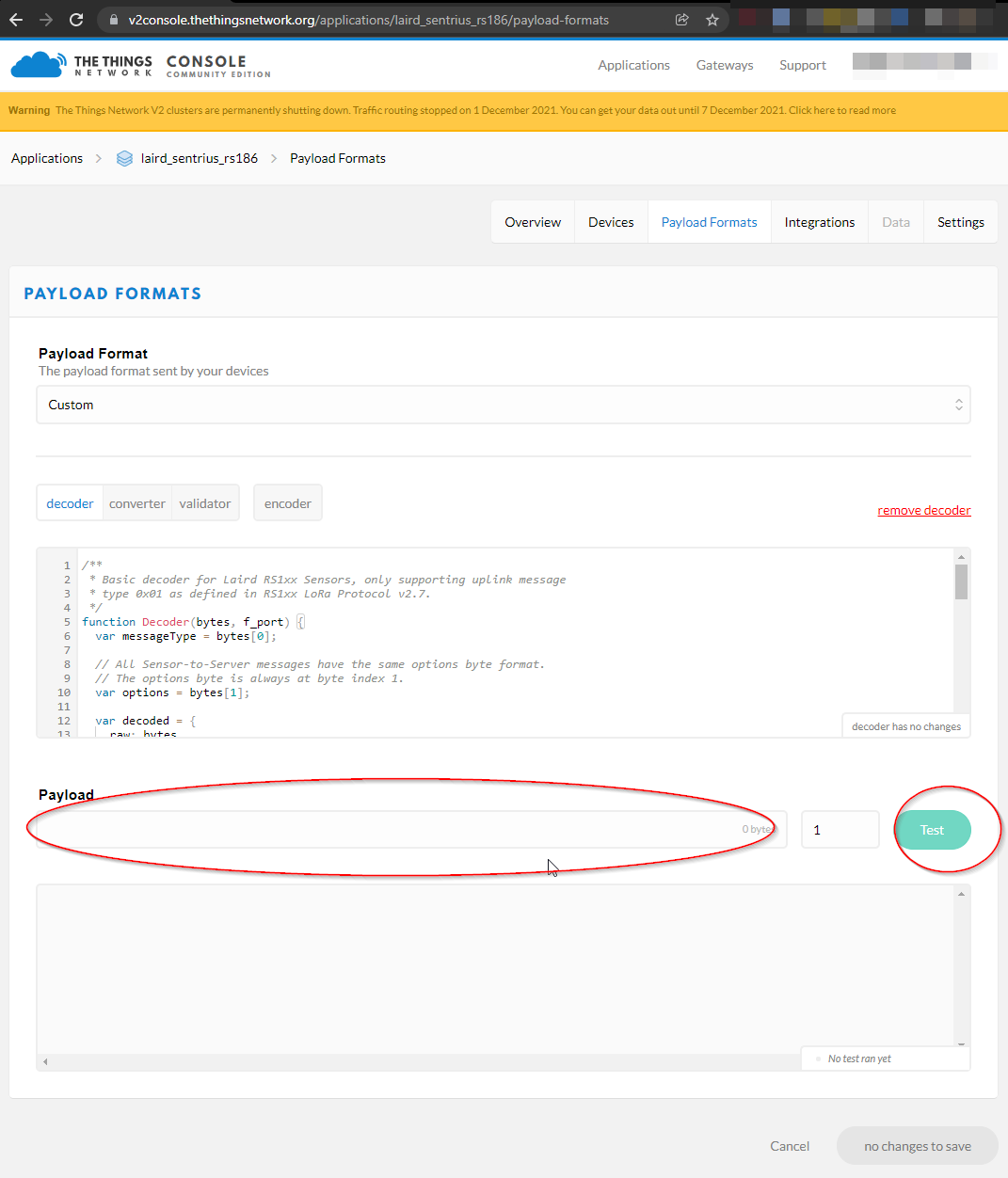Payload conversation from v2 to V3 and receiving error “TypeError: Cannot read property ‘toString’ of undefined or null at decodeUplink (:16:41(25))”. An example “frm_payload” is 5DzclmTiD88SDKU=
I have the following uplink script from v2 :
/**
Basic decoder for Laird RS1xx Sensors, only supporting uplink message
type 0x01 as defined in RS1xx LoRa Protocol v2.7.
*/
function Decoder(bytes, f_port) {
var messageType = bytes[0];
// All Sensor-to-Server messages have the same options byte format.
// The options byte is always at byte index 1.
var options = bytes[1];
var decoded = {
raw: bytes,
f_port: f_port,
messageType: messageType,
options: options,
// Just for debugging: show all 8 bits, ensuring leading zeroes
optionFlags: ‘0b’ + (‘00000000’ + options.toString(2)).slice(-8),
sensorRequestForServerTime: (options & 1<<0) > 0,
sensorConfigurationError: (options & 1<<1) > 0,
sensorAlarmFlag: (options & 1<<2) > 0,
sensorResetFlag: (options & 1<<3) > 0,
sensorFaultFlag: (options & 1<<4) > 0
};
switch (messageType) {
// 0x01 = Send Temp RH Data Notification
case 0x01:
decoded.humidity = bytes[3] + bytes[2]/100;// For temperature, both the integer and fractional parts are signed:
// a positive value of 27.43 has a fractional portion of 43 and an
// integer portion 27, and a negative value -15.87 uses -87 and -15.
// Sign-extend a single byte to 32 bits to make JavaScript understand
// negative values, by shifting 24 bits to the left, followed by a
// sign-propagating right shift of the same number of bits:
decoded.temperature = (bytes[5]<<24>>24) + (bytes[4]<<24>>24)/100;decoded.batteryIndex = bytes[6];
decoded.batteryCapacity = {
0: ‘0-5%’,
1: ‘5-20%’,
2: ‘20-40%’,
3: ‘40-60%’,
4: ‘60-80%’,
5: ‘80-100%’
}[decoded.batteryIndex] || ‘Unsupported value’;decoded.alarmMsgCount = bytes[7]<<8 | bytes[8];
decoded.backlogMsgCount = bytes[9]<<8 | bytes[10];
break;default:
decoded.error = ‘Unsupported message type’;
}return decoded;
}
I’ve changed it to V3 but getting error “TypeError: Cannot read property ‘toString’ of undefined or null at decodeUplink (:16:41(25))”"`
function decodeUplink(input,f_port) {
var bytes = input.bytes; var messageType = bytes[0]; // All Sensor-to-Server messages have the same options byte format. // The options byte is always at byte index 1. var options = bytes[1]; var decoded = { raw: bytes, f_port: f_port, messageType: messageType, options: options, // Just for debugging: show all 8 bits, ensuring leading zeroes optionFlags: '0b' + ('00000000' + options.toString(2)).slice(-8), sensorRequestForServerTime: (options & 1<<0) > 0, sensorConfigurationError: (options & 1<<1) > 0, sensorAlarmFlag: (options & 1<<2) > 0, sensorResetFlag: (options & 1<<3) > 0, sensorFaultFlag: (options & 1<<4) > 0 }; switch (messageType) { // 0x01 = Send Temp RH Data Notification case 0x01: decoded.humidity = bytes[3] + bytes[2]/100; // For temperature, both the integer and fractional parts are signed: // a positive value of 27.43 has a fractional portion of 43 and an // integer portion 27, and a negative value -15.87 uses -87 and -15. // Sign-extend a single byte to 32 bits to make JavaScript understand // negative values, by shifting 24 bits to the left, followed by a // sign-propagating right shift of the same number of bits: decoded.temperature = (bytes[5]<<24>>24) + (bytes[4]<<24>>24)/100; decoded.batteryIndex = bytes[6]; decoded.batteryCapacity = { 0: '0-5%', 1: '5-20%', 2: '20-40%', 3: '40-60%', 4: '60-80%', 5: '80-100%' }[decoded.batteryIndex] || 'Unsupported value'; decoded.alarmMsgCount = bytes[7]<<8 | bytes[8]; decoded.backlogMsgCount = bytes[9]<<8 | bytes[10]; break; default: decoded.error = 'Unsupported message type'; } return decoded;}
